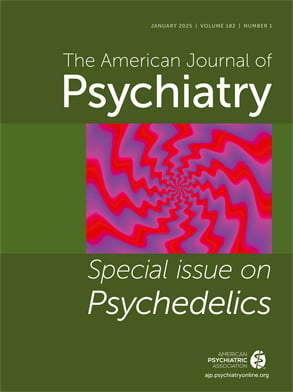T
o the E
ditor: Recreational use of synthetic cannabinoid agonist-containing compounds, commonly known as “Spice,” has become increasingly popular. These products consist of nonpsychoactive plant material coated with varying combinations of synthetic cannabinoid agonists (
1). Very little is known about the toxicology and psychiatric effects of these drugs. We present a case report in which the smoking of synthetic cannabinoid agonists precipitated new-onset psychosis.
Case Report
Ten otherwise healthy men were admitted with new-onset psychosis to the psychiatry ward at the Naval Medical Center San Diego between August and December 2010. The patients were between 21 and 25 years old and had no history of psychosis. One patient reported a family history consistent with a primary psychotic disorder (an aunt). Four patients had auditory hallucinations and two had visual hallucinations, nine had paranoid delusions, six had odd or flat affect, four had thought blocking, six had disorganized speech, seven had disorganized behavior, three had alogia, four had suicidal ideation, six had insomnia, six had psychomotor retardation, three had psychomotor agitation, and two had anxiety. A distinct waxing and waning stuporous appearance was common among these patients. Hospitalizations ranged from 6 to 10 days, and seven of the 10 patients received antipsychotics. Seven of the patients' psychotic symptoms resolved between 5 and 8 days after admission, whereas three patients continued to have psychotic symptoms more than 5 months after presentation. All of the patients in this series stated that they had smoked synthetic cannabinoid products on more than one occasion, ranging from four uses over a 3-week period to daily for 1.5 years. The onset of psychotic symptoms varied from after the fourth use to after more than 1 year of use. All patients denied psychotic symptoms before using synthetic cannabinoid products.
Two of these patients had used only synthetic cannabinoids prior to the emergence of their psychotic episodes, whereas the remaining patients had used either marijuana or alcohol along with synthetic cannabinoids. Four of the patients last used marijuana 2 or more weeks before they used the synthetic cannabinoid. The temporal relationship between synthetic cannabinoid consumption and psychotic symptoms was determined from information provided by reports from friends, family members, military command, and the patients themselves. Although the majority of the patients were able to report which brands of synthetic cannabinoid blends they smoked, determining the specific synthetic cannabinoid agonists within these blends would have required analyzing samples of the actual substance that the patient smoked; the contents of these products are not accurately listed, are constantly changing, and may not be detectable in commercially available drug screens. A urine test screened for amphetamines, phencyclidine, cocaine, and marijuana, and we obtained blood alcohol levels for all of the patients at the time of hospital admission. Results of a urine screen were positive for the patients who admitted to recent marijuana use. No other substances were found in the patients' urine, and none had detectable blood alcohol levels. Blood tests for synthetic cannabinoids were obtained, and the results were positive for two patients.
Discussion
To our knowledge, no cases of new-onset psychosis after the use of synthetic cannabinoids have been reported. Two case reports described the reemergence of psychosis following the use of synthetic cannabinoid compounds (
2,
3). In one of these cases, the patient had a history of cannabis-induced psychotic episodes (
2). A recent article reported that synthetic cannabinoid agonists may precipitate psychosis in vulnerable individuals with known psychotic illness (
4). Our case series includes patients with no known psychotic illness who experienced prolonged psychotic episodes after smoking synthetic cannabinoid blends.
The protracted presence of psychotic symptoms well beyond acute intoxication—sometimes lasting months—is concerning. Physicians should be aware that the use of synthetic cannabinoids can be associated with psychosis and investigate possible use of synthetic cannabinoids in patients with inexplicable psychotic symptoms.

